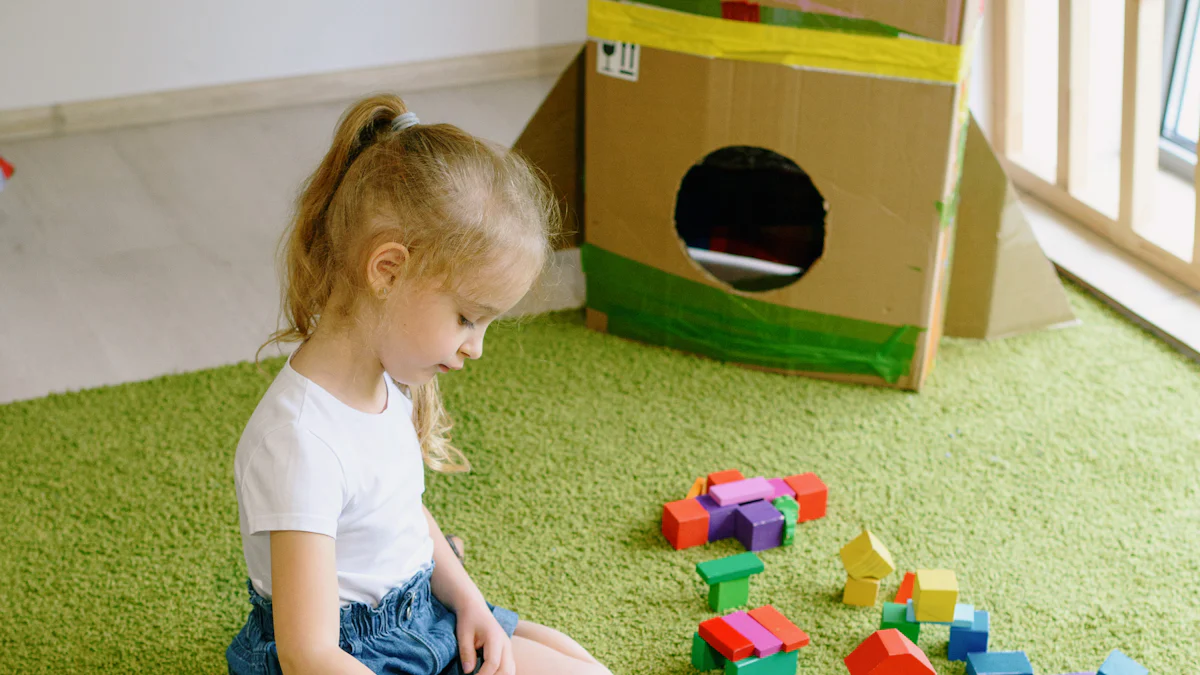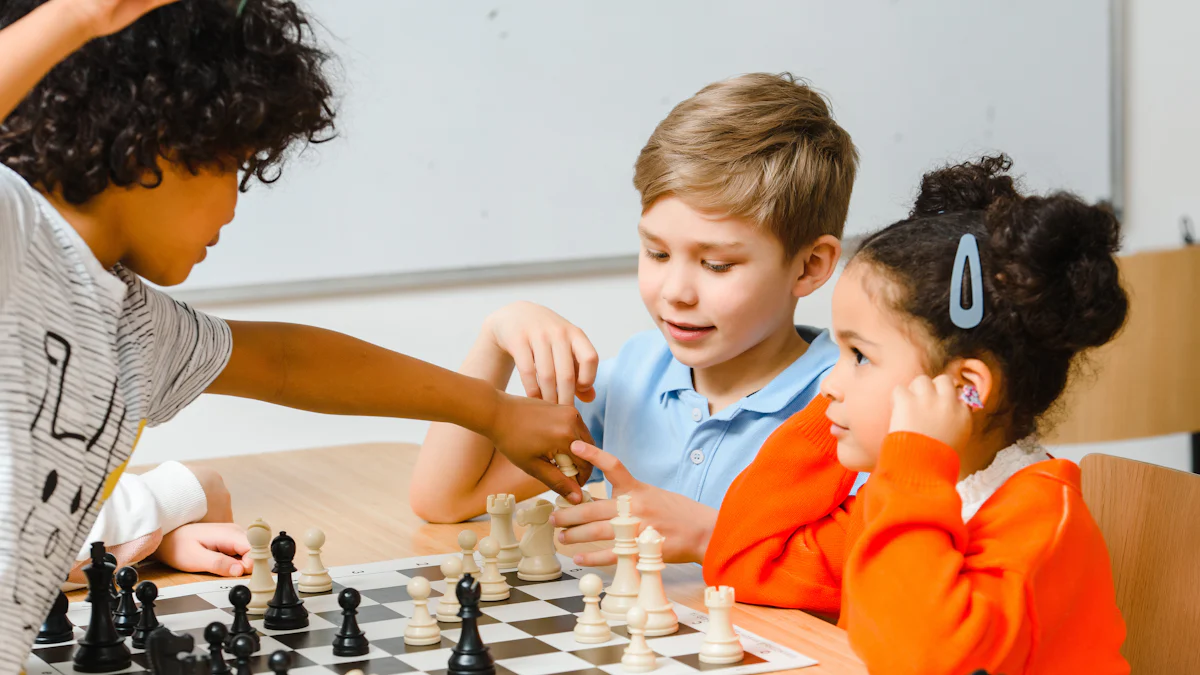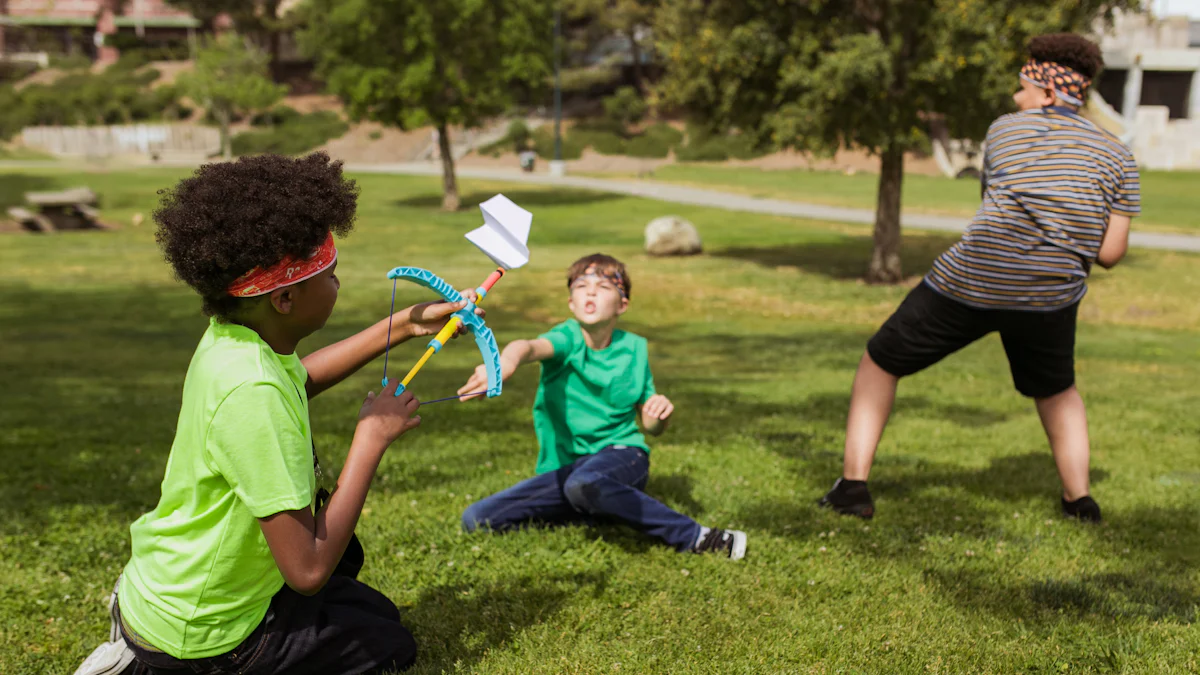games for 6 year olds

Games for 6-year-olds play a crucial role in their lives. They don't just entertain; they also enhance learning and strengthen family bonds. When you engage your child in games for 6, you help them develop essential skills like problem-solving, creativity, and teamwork. Research shows that games for 6 can boost cognitive abilities, such as impulse control and working memory. By choosing the right games for 6, you can support your child's development in a fun and interactive way. Whether it's board games, video games, or outdoor activities, each type offers unique benefits that contribute to your child's growth.
Key Takeaways
-
Engaging your 6-year-old in games enhances their creativity, problem-solving, and teamwork skills, contributing to their overall development.
-
Art and craft games, like DIY shrink art and rock painting, foster self-expression and fine motor skills while boosting confidence.
-
Imaginative play, such as dress-up adventures and puppet shows, enhances language skills and empathy, allowing children to explore different roles.
-
Puzzle games, including jigsaw puzzles and Scrabble Junior, improve critical thinking and memory, making learning fun and interactive.
-
Cooperative board games, like Hoot Owl Hoot and Outfoxed!, teach children the value of teamwork and communication as they work towards common goals.
-
Outdoor activities, such as relay races and treasure hunts, promote physical fitness while enhancing collaboration and problem-solving skills.
-
Incorporating a variety of games into family time not only strengthens bonds but also creates valuable learning experiences for your child.
Games for 6 that Foster Creativity

Creativity is a vital skill for children, and games for 6-year-olds can significantly nurture this ability. By engaging in creative activities, kids learn to express themselves, think outside the box, and develop their imagination. Let's explore some exciting games that foster creativity.
Art and Craft Games
Art and craft games offer a fantastic way for children to explore their artistic side. These activities not only entertain but also help in developing fine motor skills and hand-eye coordination.
Benefits of Art and Craft Games
Art and craft games provide numerous benefits for young children. They encourage self-expression and boost confidence as kids see their ideas come to life. These games also enhance problem-solving skills as children figure out how to create their desired outcomes. Additionally, they promote patience and perseverance, as crafting often requires time and effort.
Examples of Art and Craft Games
Here are some engaging art and craft games for 6-year-olds:
-
Shrink-Its! DIY Shrink Art Kit – Fun Friends: This kit allows kids to create unique shrink art pieces. It's a fun way to explore colors and shapes.
-
Oil Pastels Resist Art: Using oil pastels and watercolors, children can create stunning resist art. This activity encourages experimentation with different textures and techniques.
-
Storybook Drawings: Kids collaborate to craft stories and illustrate them. This game fosters teamwork and helps children build social bonds.
-
Rock Painting: A simple yet enjoyable project where kids paint on rocks. It combines outdoor activity with crafting, giving children complete creative control.
Imaginative Play
Imaginative play is another excellent way to boost creativity in children. It allows them to explore different scenarios and roles, enhancing their cognitive and social skills.
Benefits of Imaginative Play
Imaginative play offers several benefits. It helps children develop language skills as they communicate their ideas and stories. This type of play also encourages empathy, as kids put themselves in others' shoes. Moreover, it enhances problem-solving abilities as children navigate various imaginary situations.
Examples of Imaginative Play Games
Consider these imaginative play games for your 6-year-old:
-
Dress-Up Adventures: Encourage your child to dress up as different characters and create stories around them. This game sparks creativity and storytelling skills.
-
Puppet Shows: Use puppets to act out stories or create new ones. Puppet shows enhance communication skills and allow children to express emotions.
-
Building Forts: Let your child build forts using blankets and pillows. This activity promotes spatial awareness and imaginative thinking.
-
Role-Playing Games: Engage in role-playing games where your child can pretend to be a chef, doctor, or explorer. These games help children understand different professions and scenarios.
By incorporating these creative games into your child's routine, you provide them with opportunities to grow and learn in a fun and engaging way. Remember, the key is to let them explore and express themselves freely.
Games for 6 that Enhance Problem-Solving Skills
Problem-solving is a crucial skill for children, and games for 6-year-olds can significantly aid in its development. By engaging in activities that challenge their thinking, kids learn to analyze situations, make decisions, and find solutions. Let's dive into some exciting games that enhance problem-solving skills.
Puzzle Games
Puzzle games are fantastic tools for developing analytical thinking and logical reasoning. They encourage children to think critically and solve problems efficiently.
Benefits of Puzzle Games
Puzzle games offer numerous benefits. They help improve concentration and attention to detail as kids focus on completing the task. These games also enhance memory and cognitive abilities by requiring players to remember patterns and strategies. Additionally, puzzle games foster patience and perseverance, as solving them often involves trial and error.
Examples of Puzzle Games
Here are some engaging puzzle games for 6-year-olds:
-
Jigsaw Puzzles: These classic puzzles help children develop spatial awareness and problem-solving skills. They learn to recognize patterns and fit pieces together.
-
Scrabble Junior: This word game enhances vocabulary and spelling while promoting strategic thinking. Kids learn to form words and score points creatively.
-
Crosswords: These puzzles boost language skills and logical reasoning. Children enjoy filling in the blanks with the correct words.
-
Online Puzzle Games: Digital puzzles offer interactive experiences that improve hand-eye coordination and quick thinking.
Strategy Board Games
Strategy board games present complex challenges that require planning and decision-making. They simulate real-life scenarios, helping kids develop critical thinking skills.
Benefits of Strategy Board Games
Strategy board games provide several benefits. They teach children to plan ahead and anticipate opponents' moves. These games also enhance social skills, as players interact and negotiate with each other. Moreover, strategy games promote flexibility and adaptability, as kids adjust their tactics based on changing circumstances.
Examples of Strategy Board Games
Consider these strategy board games for your 6-year-old:
-
Chess: This classic game develops strategic thinking and foresight. Kids learn to plan multiple moves ahead and adapt to their opponent's strategies.
-
Checkers: A simpler alternative to chess, checkers still requires strategic planning and decision-making. Children enjoy capturing opponents' pieces and advancing their own.
-
Ticket to Ride: First Journey: This game introduces kids to route-building and resource management. They learn to plan routes and complete objectives.
-
Blokus: A fun game that encourages spatial reasoning and strategic placement. Players aim to place all their pieces on the board while blocking opponents.
By incorporating these problem-solving games into your child's routine, you provide them with opportunities to grow and learn in a fun and engaging way. Remember, the key is to let them explore and challenge themselves freely.
Games for 6 that Encourage Teamwork

Teamwork is an essential skill for children to learn, and games for 6-year-olds can be a fun way to develop this ability. By playing games that require collaboration, kids learn to communicate effectively, work towards common goals, and understand the value of cooperation. Let's explore some engaging games that encourage teamwork.
Cooperative Board Games
Cooperative board games are fantastic for teaching children how to work together. Unlike competitive games, these require players to collaborate to achieve a shared objective, fostering a sense of unity and teamwork.
Benefits of Cooperative Board Games
Cooperative board games offer numerous benefits. They enhance communication skills as players discuss strategies and make decisions together. These games also promote empathy and emotional intelligence, as children learn to consider others' perspectives and feelings. Additionally, they encourage patience and perseverance, as players must work through challenges collectively.
Examples of Cooperative Board Games
Here are some cooperative board games that your 6-year-old might enjoy:
-
Peaceable Kingdom Hoot Owl Hoot: In this game, players work together to help owls return to their nest before sunrise. It encourages strategic thinking and teamwork.
-
Outfoxed!: A cooperative whodunit game where players gather clues to catch the thief. It enhances problem-solving skills and promotes collaboration.
-
Race to the Treasure!: Players team up to build a path and collect keys before the ogre reaches the treasure. This game fosters planning and teamwork.
-
The Magic Labyrinth: A memory-based game where players navigate a maze to collect symbols. It requires communication and cooperation to succeed.
Outdoor Team Activities
Outdoor team activities provide a great opportunity for children to engage in physical play while learning teamwork. These activities encourage kids to work together in a dynamic environment, enhancing their social and motor skills.
Benefits of Outdoor Team Activities
Outdoor team activities offer several benefits. They promote physical fitness and coordination as children engage in active play. These activities also enhance communication and collaboration skills, as kids must work together to achieve their goals. Moreover, they foster creativity and problem-solving as children navigate various challenges.
Examples of Outdoor Team Activities
Consider these outdoor team activities for your 6-year-old:
-
Capture the Flag: A classic game where teams compete to capture the opponent's flag. It encourages strategic thinking and teamwork.
-
Relay Races: Teams race against each other, passing a baton from one member to the next. This activity promotes cooperation and coordination.
-
Treasure Hunts: Organize a treasure hunt where teams work together to find hidden items. It enhances problem-solving skills and encourages exploration.
-
Obstacle Courses: Set up an obstacle course that requires teamwork to complete. This activity fosters communication and collaboration.
By incorporating these teamwork-focused games into your child's routine, you provide them with valuable opportunities to learn and grow. Remember, the key is to let them explore and enjoy the process of working together.
Engaging your 6-year-old with games offers a treasure trove of benefits. These activities enhance creativity, problem-solving, and teamwork skills. They also boost cognitive development and social interaction. By incorporating games into family time, you create opportunities for bonding and learning. Games for 6 provide a fun and interactive way to support your child's growth. So, dive into this world of play and watch your child thrive. Remember, the joy of playing together is priceless.
FAQ
What are the benefits of kids playing video games?
Video games can offer several benefits for children. They can enhance cognitive skills, such as problem-solving and strategic thinking. By choosing appropriate games, you can help your child learn in a fun and engaging way. Educators can also use video games to supplement classroom teaching, making learning more interactive.
How much time should kids spend playing video games?
Dr. Bilge-Johnson suggests limiting video game play to 1 hour a day during the week and up to 2 hours on weekends. Setting these limits helps ensure that gaming remains a healthy part of your child's routine. It's also important to monitor the content of the games to ensure they are age-appropriate.
How can I choose the right games for my child?
Selecting the right games involves considering both the content and the skills they develop. Look for games that promote creativity, problem-solving, and teamwork. An informed choice can help your child develop enhanced cognition while having fun.
Are there any educational games suitable for 6-year-olds?
Yes, many educational games are designed specifically for young children. Games like 'Zingo! Sight Words' and 'Skillmatics Guess in 10 Junior' focus on literacy and critical thinking skills. These games make learning enjoyable and interactive.
Why is play important for children's development?
Play is fundamental for a child's development at any age. It helps them learn new skills, express themselves, and build social connections. Through play, children explore the world around them and develop essential life skills.
Can board games help with social skills?
Absolutely! Board games often require players to communicate, negotiate, and collaborate. This interaction helps children develop social skills and understand the importance of teamwork and cooperation.
What types of games encourage physical activity?
Outdoor games like 'Capture the Flag' and 'Relay Races' encourage physical activity. These games not only promote fitness but also teach children about teamwork and strategy in a dynamic environment.
How do games foster creativity in children?
Games that involve art, craft, and imaginative play allow children to express themselves and think creatively. Activities like rock painting or puppet shows encourage kids to explore their artistic side and develop their imagination.
Are there any digital games that are beneficial for 6-year-olds?
Yes, many digital games offer educational content while keeping children entertained. Look for games that focus on counting, matching, and memory to support cognitive development in a fun way.
How can games strengthen family bonds?
Playing games together as a family creates opportunities for bonding and communication. It allows you to spend quality time with your child, share experiences, and create lasting memories. Games provide a platform for learning and growing together.
See Also
15 Fun Party Games That Guarantee a Win
10 Creative Games Like Roblox for Imaginative Players
Must-Play Roblox Horror Games for 2024 Thrills